
Davao Gulf is a gulf situated in the southeastern portion of Mindanao in the Philippines. It has an area of 308,000 hectares. Davao Gulf cuts into the island of Mindanao from Philippine Sea. It is surrounded by all five provinces in the Davao Region. The largest island in the gulf is Samal Island. Davao City, on the gulf's west coast, is the largest and busiest port on the gulf. The Bagobo, a tribe known in Davao, are living in the Davao Gulf. With the thrust of Davao City towards information technology and it-enabled services (ITES), Davao City and the Davao Gulf area have also earned the moniker Silicon Gulf.

Davao Region, formerly called Southern Mindanao, is an administrative region in the Philippines, designated as Region XI. It is situated at the southeastern portion of Mindanao, comprising five provinces: Davao de Oro, Davao del Norte, Davao del Sur, Davao Oriental, and Davao Occidental.

Davao Oriental is a province in the Philippines located in the Davao Region in Mindanao. Its capital is Mati, and it borders the province of Davao de Oro to the west, and Agusan del Sur and Surigao del Sur to the north. The province is the traditional homeland of the Mandaya and Kagan people.
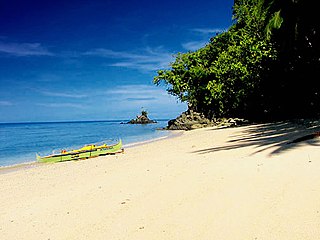
Soccsksargen, formerly known as Central Mindanao, is an administrative region of the Philippines, located in south-central Mindanao. It is numerically designated as Region XII. The name is an acronym that stands for the region's four provinces and 1 city. The regional center is in Koronadal located in the province of South Cotabato, and the center of commerce and industry is General Santos, which is the most populous city in the Region.
Acronyms and Portmanteau are popular in the Philippines. They are widely used in different sectors of Philippine society. Often, due to long full names of the institutions in the Philippines, acronyms are then utilized to shorten the name of an institution or a company in the country, making it more convenient to the majority of the Philippine population, but sometimes causing ambiguity.

Digos, officially the City of Digos,, or simply referred to as Digos City, is a 2nd class city and capital of the province of Davao del Sur, Philippines. According to the 2015 census, it has a population of 169,393 people.
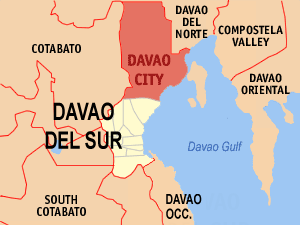
Davao City, officially the City of Davao, is a 1st class highly urbanized city in the island of Mindanao, Philippines. The city has a total land area of 2,443.61 km2 (943.48 sq mi), making it the largest city in the Philippines in terms of land area. It is the third-most populous city in the Philippines after Quezon City and Manila, the most populous city in the country outside Metro Manila, and the most populous in Mindanao. As of the 2015 census the city had a population of 1,632,991.

Panabo, officially the City of Panabo, or simply referred to as Panabo City is a 3rd class city in the province of Davao del Norte, Philippines. According to the 2015 census, it has a population of 184,599 people.

Tagum, officially the City of Tagum,, or simply referred to as Tagum City, is a 1st class city and capital of the Davao del Norte, Philippines. According to the 2015 census, it has a population of 259,444 people making it the most populous component city in Mindanao.
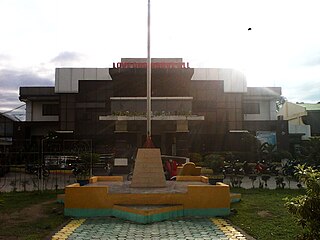
Santo Tomas, officially the Municipality of Santo Tomas, is a 1st class municipality in the province of Davao del Norte, Philippines. According to the 2015 census, it has a population of 118,750 people.
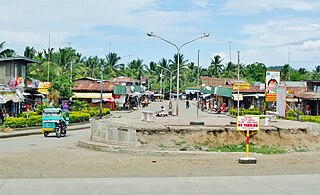
Sulop, officially the Municipality of Sulop, is a 3rd class municipality in the province of Davao del Sur, Philippines. According to the 2015 census, it has a population of 33,613 people.

Mati, officially the City of Mati and also referred to as Mati City, is a 5th class city and the capital of the province of Davao Oriental, Philippines. According to the 2015 census, it has a population of 141,141 people.

One of the most dynamic and fastest growing sectors in the Philippines is the information technology–business process outsourcing (IT-BPO) industry. The industry is composed of eight sub-sectors, namely, knowledge process outsourcing and back offices, animation, call centers, software development, game development, engineering design, and medical transcription. The IT-BPO industry plays a major role in the country's growth and development.

The University of Mindanao is the largest private, non-sectarian university in Mindanao located in Davao City on the Southern Philippine island. Established in 1946, the University of Mindanao has ten branches spread over thirteen campuses in Southern Mindanao. It is currently an Autonomous Status per CEB Resolution No. 076-2009 with Category A (t) per CMO No. s. 2009 standing accredited by Commission on Higher Education (CHED). Its Accountancy, Computer Engineering and Information Technology programs are Centers of Development(COD) and its Business Administration, Criminology and Teacher Education programs are recognized as Centers of Excellence(COE) by CHED. It is the largest private university in Mindanao and hailed as the institution with the second highest number of programs accredited by PACUCOA in the country today.
The Philippine Cyberservices Corridor is a plan that is being pursued by the government of the Philippines to create interconnected centers of technology-related services, that are spread out all over the country. Services include business process outsourcing, medical transcription, outsourcing of animation, and the like. It is part of the ten-point agenda of President Gloria Macapagal-Arroyo and is one of the five "super-regions" outlined in her 2006 State of the Nation Address.
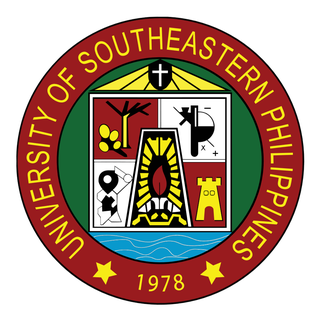
The University of Southeastern Philippines and is a state research university based in Davao City, Davao del Sur, Philippines. Founded on December 15, 1978, the university is an integration of four state institutions: Mindanao State University-Davao, the University of the Philippines-Master of Management Program in Davao, the Davao School of Arts and Trades, and the Davao National Regional Agricultural School. It was the first state university in Davao Region.

Abreeza Mall is a large shopping mall complex located at J.P. Laurel Avenue, Bajada in Davao City, Philippines. It is the first Ayala Shopping Center located in Mindanao. It opened on May 12, 2011. It is owned by Accendo Commercial Corporation, a joint venture company of Ayala Land and Anflocor.
DXUR, currently branded as Halo Halo 97.1, is a music FM radio station owned by Viva Live, Inc. in the Philippines. The station's studio is located at Unit 49, 4th floor of Landco Corporate Center Bldg., J.P. Laurel Avenue Bajada 8000 Davao City and its transmitter located at JP Laurel Ave., Bajada, Davao City. It is the second FM station of the Del Rosario's Viva group, and the first in the Mindanao region.

SM Lanang Premier, also known locally as SM Lanang, is an indoor four-story shopping mall in Lanang, Davao City, Philippines along Jose P. Laurel Avenue and within S.P Dakudao loop. It is the first SM Supermall to be called "Premier". The mall is owned by Henry Sy, Sr. and managed by SM Prime Holdings. Construction of the mall started in 2011 and opened to the public on September 28, 2012, on the site of the former Lanang Golf and Country Club.

















